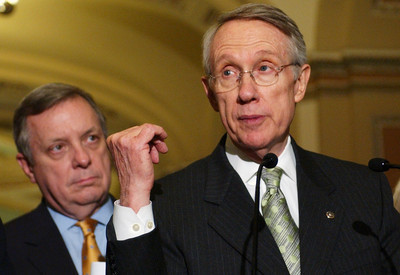Stimulus bill sent to Bush
WASHINGTON -- Lawmakers overwhelmingly approved a broad economic stimulus bill last week after days of wrangling in the Senate over the scope of the legislation.
Senators agreed on a $152 billion measure to provide tax rebate checks to all Americans who make $75,000 or less annually, including senior citizens and disabled veterans. The stimulus legislation also includes tax breaks for businesses.
The Senate approved the bill 81-16.
It then passed the House, 380-34.
President Bush is expected to sign the measure this week. Rebate checks of up to $600 per individual and $1,200 per couple could be mailed as early as May.
The stimulus package is geared toward reviving an economy on the verge of recession. Lawmakers sought to target rebate checks to Americans who would spend the money.
Workers who make $3,000 or more in a year, even if they paid no income tax, would be eligible for at least $300 per person. Those qualifying for checks would receive $300 per child.
About 20 million senior citizens and 250,000 disabled veterans would also qualify for a rebate.
The Senate inserted seniors and disabled veterans to an earlier House version that did not give checks to the two groups. The add-ons came only after a more extensive plan endorsed by the Senate Finance Committee fell one vote short in a key test vote.
To encourage investment, businesses could write off some or all of the cost of new equipment purchases, depending on the size of the company. In response to the home mortgage crisis, the bill increases loan limits for the Federal Housing Administration and lenders Fannie Mae and Freddie Mac.
Sen. Harry Reid, D-Nev., voted for the stimulus package. Sen. John Ensign, R-Nev., voted against it.
Reps. Shelley Berkley, D-Nev., and Dean Heller, R-Nev., voted for it. Rep. Jon Porter, R-Nev., did not vote.
The expanded Finance Committee proposal stalled in the Senate on a 58-41 vote. Sixty votes were needed to prevent a Republican filibuster. The initial margin was 59-40, but Reid switched his vote in a parliamentary maneuver that would have allowed him to bring the measure back to the floor.
Every Democrat and eight Republicans supported that plan, which offered help to home builders, extended unemployment benefits, provided heating assistance for low-income Americans and gave more short-term tax relief to businesses.
Republicans questioned whether all the add-ons truly were stimulative, or merely favors for Democratic constituent groups.
Ensign opposed the expanded version of the stimulus package.
HIGHER ED BILL CLEARS HOUSE
The House voted to give higher education a face-lift, passing a bill 354-58 that would renew decade-old college, university and federal financial aid regulations.
The bill aims to hold schools accountable for rising costs and decrease student debt. It would penalize states that reduce their financial commitments to colleges and universities.
It would also require schools and lenders to provide more information to students looking to borrow money and ban lenders from rewarding schools that put them on a "preferred lender" list.
Rep. Howard McKeon, R-Calif., said the additional information given to students would help them keep costs down.
Critics disagreed with the idea of penalizing states for reducing spending, saying the states should be allowed to decide how to spend their money.
Berkley and Heller voted for the bill. Porter did not vote.
Members rejected, 179-236, an amendment by Rep. Danny Davis, D-Ill., that would allow students an easier path to have their college debts excused during bankruptcy.
Berkley and Heller voted against the Davis amendment. Porter did not vote.
BILL AMENDMENTS FAIL
Senators turned back two amendments to a controversial electronic surveillance bill that probably will be completed this week.
The amendments proposed by Sen. Russ Feingold, D-Wis., came as lawmakers continued work on revising the Foreign Intelligence Surveillance Act.
Debate focused on balancing the privacy rights of Americans against the desire for the government to tap suspected terrorists.
One provision, rejected 56-40, would have given the FISA court the choice to block the government from using information about a U.S. citizen if that information had been collected illegally.
The FISA court oversees government eavesdropping on telephone calls and e-mails of people within the United States.
Ensign voted against the amendment. Reid voted for it.
Another Feingold amendment failed 57-38. It would prevent what is called "reverse targeting." It would block the government from wiretapping a foreign individual who is communicating with someone in the United States, when the real target is the person in the United States.
Feingold's amendment would require a FISA court order whenever the intent of the surveillance is to monitor an American inside the United States.
Ensign voted against it. Reid voted for it.

















